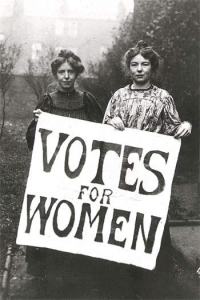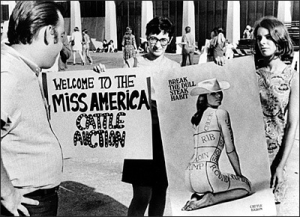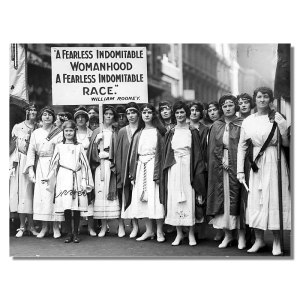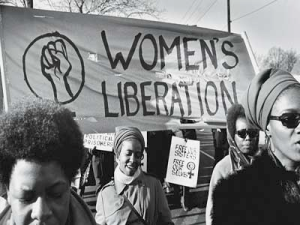Despite its common use today, the word feminism is still met with confusion and disdain. Many men and women confuse feminist stereotypes with the movement’s goals, forming negative associations with the word. But what is a feminist? And how is feminism seen today? At its core, feminism is about equality for the sexes and the success of both women and men. Today, feminism is most prominently seen on various social media platforms. Social media has helped to fully bring feminism into mainstream culture, creating a shift in society’s perception of the movement. Recently, feminist ideas have been featured in successful advertisements for companies such as Dove, Verizon, and Always. This widespread acceptance of feminist ideals is largely attributable to the power of social media.
Feminism: A Little History
Traditionally, feminism is broken into waves based on time period and ideology. The First Wave, from approximately 1840-1920, developed around the desire for women’s suffrage and equal rights of citizenship. This goal developed from female involvement in the abolition movement, after which women recognized the rights they were being denied. While campaigning for suffrage, early feminists also made remarkable progress for women’s rights by promoting dress reform and birth control, as well as earning women the right to own property, get divorced, pursue higher education, maintain their own income and inheritance, and retain custody of their children following divorce. Following the legalization of women’s suffrage in America in 1920, the women’s movement retained its importance but became more understated. This changed around 1960 with the arrival of the Second Wave of feminism.
By 1960, the Civil Rights Movement was sweeping the United States with incredible force. As young people began to protest for racial equality, women, as in the early 1900s, realized the inequality of their own situation. Instead of suffrage, these Second Wave feminists sought access to traditionally male domains to which they had been denied. This pursuit did not intend to usurp men, but to break “down gender stereotypes, thus emphasizing that feminism was of importance to men as well as to women” (psa.ac.uk). Feminists emphasized their position by coining “the phrase ‘the personal is political’ as a means of highlighting the impact of sexism and patriarchy on every aspect of women’s lives” (psa.ac.uk). This made the movement more relevant, and in response women developed a vocabulary to address common injustices, including the terms date rape and domestic abuse. The feminists’ protests and lobbying, though sometimes radical, earned women greater reproductive rights, protection from workplace discrimination, and the right to equal pay, at least in theory. Despite the wide cultural changes that resulted from the Second Wave, the movement was flawed and harshly criticized. Women within the movement too often considered women to be a homogenous group and did not consider the facets included, such as black women, Latinas, women with disabilities, and lesbians and bisexuals, among others. These minority groups felt sidelined and began critiquing the movement from within, causing tension and divisive splits over feminist theories. By the end of the 1980s, the feminist movement was in a difficult position. Young women of the 1990s and early 2000s sought to address these issues in what is known as the Third Wave of feminism.
The Third Wave represented a monumental shift in the way women approached feminism and the way feminism was shared. This shift was largely influenced by the overall cultural shift toward individualism. By focusing on a woman’s personal struggles, the Third Wave “rejected the idea of a shared political priority list or even a set of issues one must espouse to be feminist” (feminist.com). This individualistic nature allowed for diverse interests to gain widespread attention, including the topics of queer theory, gender and sexuality spectrums, and sex positivity. Feminism’s individualism also made the movement portable- “you didn’t have to go to a meeting to be a feminist; you could bring feminism into any room you entered” (feminist.com). This portability allowed feminism to easily transition into the digital age.
Today, the Fourth Wave of feminism is “characterized by its diversity of purpose” and “…-its reliance on the Internet.” By 2008, “…the Internet had facilitated the creation of a global community of feminists…” in a way that was previously impossible. Without the Internet and social media, the progression of the newest wave of feminism would have been slowed, if possible at all.
Social Media:
At the dawn of social media, online forums were intended for causal connections. Over time, Facebook and Twitter, as well as other prominent social media platforms, have expanded beyond this original intent and have become staples of 21st century activism. Though many were surprised by this development, it is understandable given that the term ‘platform’ brings to mind the sharing of ideas and the promotion of a cause. Following this realization, many social movements took to social media, including feminism.
Today, 74 percent of adults in America use the internet and 76 percent of women online utilize social media. Feminists utilize social media’s person to person model to connect with like-minded women across geographic and socioeconomic boundaries. In an interview with The Observer, prominent feminist and global director of Equality Now, Yasmeen Hassan, stated, “…the internet is opening up channels between women in different countries, and women who might be isolated in their communities….” This open communication allows for improved representation of “often ignored voices” (now.org). Contemporary feminism seeks to move away from the white, middle-class demographic to include all races, sexual orientations and gender identities, and socioeconomic classes.
By diversifying the backgrounds of the women involved, feminists are also diversifying the messages being presented. Feminism no longer has a set agenda, but appeals to the individual struggles of all women and unites them through similar experience. In an article for the HuffingtonPost, Victoria Sadler summed up this idea, stating, “Prior to the era of social media, not only did the forums not exist for these ideas to be fully identified and discussed, but instead women were dictated to about what their issues were…Now with social media, women as a whole aren’t responding to articles in the media, they are creating the news for themselves by shining a light on the breadth of issues that they face.”
Sharing these personal experiences has become easier in the digital age. Prior to the internet, feminists spread ideas through print publications, protest rallies, and gatherings. For women without means to attend such events or in areas without access to feminist publications, information and female solidarity were lacking. Though not all women have access to the Internet today, the number who do is steadily increasing. Once connected to the Internet and social media, these women are able to share topics of interest through either public sharing or direct sharing to specific individuals. ‘Sharing’ is one of the most popular methods of promoting information because it has a viral effect, going from “person to person through connection.” This viral web of information is attention grabbing and is an effective way for feminists to quickly disseminate material to a widespread audience. Another popular method for organizing and spreading information is the hashtag. Hashtags are used on sites such as Twitter and Facebook to organize information under specific topics, thus allowing users to track trends and the usage of certain hashtags. Feminists assign hashtags to certain initiatives within the movement or issues they would like to highlight, allowing women around the world to easily follow posts associated with the movement. This makes it possible for women to remain up to date on feminist happenings, even when the movement is not covered by the mainstream news.
Use across Cultures:
Despite the interconnectedness promoted by social media use, feminists across the world utilize social media for a diverse range of purposes.
In Western countries, prominently the United States, feminists use social media to address issues that are subtly ingrained in our society. A main issue addressed by social media in the U.S. is violence and harassment against women. This issue has received prominent coverage within the last year, especially following the Elliot Rodger shootings in Isla Vista, California in May 2014. Rodger, driven by a misogynistic worldview and a desire for revenge against women, killed six people and wounded multiple others before taking his own life. The day after the shootings, May 24th, the hashtag #YesAllWomen surface online. Within twenty-four hours, the hashtag was being used 61,500 times per hour at the peak of its popularity. #YesAllWomen used the Isla Vista tragedy to illustrate that misogyny and violence against women continues to exist. Furthermore, the hashtag created a forum for open conversation about women’s experiences with harassment and male sexual entitlement. While feminist issues in the United States are more nuanced, they are often very black and white around the world.
In the Middle East, women are using social media to assert their rights in the face of continuing discrimination. Traditionally shying away from the pressure of public forums, women in the Middle East are flocking to social media to assert themselves. Women in Turkey are a prominent example. According to the Political Studies Association of the U.K., women make up 72 percent of social media users in Turkey. This online dominance was useful in July 2014, when Turkey’s Deputy Prime Minister, Bülent Arınç, called for an end to women laughing in public. This statement was included in a speech that urged Turkish citizens to cease activities that were promoting a “moral regression” in Turkey. Immediately, women began posting photos of themselves smiling and laughing on social media in defiance of Arınç’s request. They accompanied the photos with the hashtags #kahkaha, #direnkahkaha, and #direnkadin, which translate to laughter, “Resist Laughter”, and “Resist Woman”, respectively. As a sign of solidarity with the women of Turkey, women around the world posted similar photos, including UN Women Goodwill Ambassador Emma Watson. Though this issue may seem trivial, infringement of the basic right to laugh publicly is a simple example of the oppression women in certain cultures face.
Criticisms:
Despite the good social media has done for the feminist movement, there are many critiques. A prominent criticism is that the online feminist community has become toxic. Like many social movements, there is misunderstanding and division between the movement’s supporters based on single issue interests, race, socioeconomic status, etc. Social media is making these divisions more defined and, in some cases, hostile. Critics state that online feminists quickly turn on one another for breaches of conduct, creating an atmosphere in which women are afraid to speak up out of fear of chastisement. This toxicity taints the whole movement, given that most of today’s feminist activism is being organized and promoted online.
Aside from the instances of bullying, other critics are concerned that minority groups are being underrepresented. As in the past, the majority of feminist attention is garnered by middle class, white women, despite the fact that minority issues comprise a significant portion of the feminist movement. This in turn leads to the problem of ‘privilege-checking’, in which people are reminded not to speak for others- especially people outside of the same demographic group. ‘Privilege-checking’ presents a problem because it has reached excessive heights, causing women to withhold their opinions instead of engaging in open dialogue and making honest progress.
These issues, along with others, have lead many online feminists to denounce the use of social media, stating that the feminist blogosphere is too much of an “insular, protective, brittle environment” for productive change to emerge (thenation.com).
Reflection:
After researching this topic, I have come to several conclusions. Firstly, despite its flaws, social media is an incredible asset to the feminist movement. The ability to share information and organize women across the world almost instantly is an invaluable tool, and one that should not be discredited. Though division exists within the movement and social media helps to exasperate those divisions, I believe that is more a fault of the social media system and less a flaw within the feminist movement. Online toxicity is not exclusive to feminism and never will be. To combat the negative atmosphere created by social media, it may be beneficial for feminists to seek a better balance between social media use and in-person efforts. By promoting in person relationships and gatherings, feminists can remove the impersonal nature of the Internet and humanize the movement. This would allow social media to remain a tool of the movement, instead of a representation of the movement in its entirety.
Secondly, I agree that the feminist movement is flawed and needs to become more inclusive. Divisions may always exist, but that does not meant that feminists cannot be understanding toward other points of view. This issue can be resolved and addressing it will ultimately make the movement stronger. Despite the flaws, I believe the contemporary feminist movement promotes relevant issues and continues to be an important part of society.
Feminism: A Photo History
Works Cited
http://now.org/blog/digifem2-social-media-and-feminism/
http://www.theguardian.com/world/2013/jun/01/activists-feminism-digital
http://www.newyorker.com/culture/culture-desk/the-power-of-yesallwomen
http://www.feminist.com/resources/artspeech/genwom/baumgardner2011.html
http://www.pewinternet.org/2013/12/30/social-media-update-2013/
http://www.unwomen.org/en/partnerships/goodwill-ambassadors/emma-watson
http://www.aljazeera.com/indepth/opinion/2011/03/201134111445686926.html
http://www.huffingtonpost.co.uk/victoria-sadler/social-media-feminism_b_3981098.html
http://www.thenation.com/article/178140/feminisms-toxic-twitter-wars?page=0,3
http://www.psa.ac.uk/insight-plus/feminism-fourth-wave
http://womenshistory.answers.com/feminism/accomplishments-of-second-wave-feminism
http://mashable.com/2014/05/26/yesallwomen-hashtag/







Katie, you did a wonderful job explaining the different waves of feminism as well as rightfully marking that social media has caused a revolutionary shift in feminism’s fourth wave. As far as the general sentiment towards feminism goes, do you believe that social media has been more helpful or toxic in making feminism an acceptable movement today? I know that many of the women I know fear declaring themselves as feminists due to the negative connotation that word brings. Is social media at the root of this fear, or has it always been present in past waves of feminism?
LikeLike
Much of the ugliness of Gamergate has played out on social media, showing the toxicity that you mention, Sam: http://gawker.com/what-is-gamergate-and-why-an-explainer-for-non-geeks-1642909080 But the #lessclassicallybeautiful and #yesallwomen social media outpourings showed some strength in numbers.
LikeLike
Sam, thank you for the compliment! Negative sentiments surrounding the word feminism have existed since the beginning of the movement in the mid-1800s. Much of the negativity stems from public misunderstanding of the word’s meaning. At it’s core, feminism is about equality of the sexes and the advancement of men and women, not women over men as many people believe.
Overall, I think that social media has done more to help the movement than harm it. Though feminist use of social media does have its drawbacks, social media has helped to bring feminist ideas more into the mainstream and presents them in an accessible way. The popular feminist themed campaigns that I highlighted in my intro have also made it more acceptable for women to embrace the title of feminist. When major companies such as Dove and Verizon support feminist ideals, I think it makes women feel comfortable supporting them as well.
LikeLike
I enjoyed reading this project because most of the information I know about feminism has come from these social media sites where so much toxicity exist. Many people have tried to distinguish between true, good-hearted feminist and the toxic, sometimes sexist ones that tarnish the reputation of feminism by using terms like “feminazis” and ” tumblr feminists”. I was just wondering what your opinion was on the use of words like these, and if you think there should be a distinction between different views of feminism.
LikeLike
Katie, I loved reading this! It was well-inofrmed and well-written. Talking about the other “f-word” as I’ve heard it called is always difficult. Just wondering, as far as the movement goes, do you think feminism should include those who identify as female (like transgendered women) as well? I’ve heard the argument several times from trans-exclusionary radical feminists (or TERFs as I’ve seen it abbreviated) that they shouldn’t be included because they aren’t “real women.” It’s been a subversive idea that I’ve seen all over social media. What are your thoughts?
LikeLike
Kalli, thank you for the compliments! I think that transgendered women should absolutely be included in the movement. Excluding them contradicts the movement’s purpose of equality and inclusion and undoes the progress the Third Wave made toward understanding gender and sexuality spectrums and the experiences of transgender individuals. Also, as evidenced by the #HeforShe campaign, feminism is not exclusive to “real women” and needs to be supported by everyone in order to be successful.
LikeLike
This was such a well-thought-out project that hit so many of feminism’s complexities. I really enjoyed reading!
However, one thing I have noticed lately is criticism over calling certain people “feminists.” For example, Joan Rivers was noted several times for being a feminist figure, and this brought on a lot of controversy in the Tumblr feminism community. Some believed Rivers didn’t deserve the label because a large portion of her career was based on criticizing women. While it is undeniable that Rivers made it big in a male dominated field, some say that alone doesn’t make her a feminist.
I’ve also heard the argument that men and women who view pornography should never identify as feminists, since they are contributing to an industry that profits from the exploitation and abuse of women.
Thoughts?
LikeLike
Erica, great questions! I’ve had limited experience with Joan Rivers’ career, but I’ve always enjoyed her brash humor while hosting Fashion Police on the E! Network. Though at times her commentary could be offensive, I believe it was in the name of comedy and was not intended to be hurtful to the subjects. Personally, I don’t believe that her commentary should negate her accomplishments and the path she helped pave for other women. On Fashion Police, Joan’s critiques were in the context of fashion and style, in line with the show’s subject matter. Had she been criticizing women out of context and with harmful intent I think her legitimacy as a feminist figure would be more questionable.
As for the question of feminism and pornography, I’m not sure about my feelings on the subject. My first thought is that the industry is anti-feminist because it exploits women, but I also know that there are movements within the porn industry that attempt to dispel this understanding of porn and its intent . Namely, female porn stars speaking out about their sexual empowerment- which was a major aspect of the Second Wave of feminism. I think I would need to do more research on this topic before I could give you a more conclusive answer.
LikeLike
Katie, I really enjoyed reading this as well. A lot of my friends in high school labeled themselves as feminists and dealt with a lot of ignorance from the misogynistic men in our grade. Although I didn’t understand the movement at first, social media led the way for my friends to speak their views and I gained an understanding after seeing the hashtag #YesAllWomen all over Twitter.
One interesting trend I have also seen on Twitter regarding feminism is the hashtag #HeForShe. This trend illustrates gender equality as not only a struggle for women led by women, but a human rights issue in which men can address the gender inequalities as well. Created by Emma Watson, the #HeForShe movement has had many celebrities join the movement as well to take a stand against discrimination and violence towards women. Here is a link to the website if you are interested: http://www.heforshe.org/
LikeLike
Drew, thank you for the link! I follow UN Women on Twitter and I remember when they announced Emma Watson as their new ambassador and the face of the #HeforShe campaign. I had hoped to include it in the project, but realized that it was impossible to include every example. #HeforShe is a great example of a social media campaign that was used to create interest in feminist ideals and rally men and women around the idea of gender equality. Thank you for mentioning it!
LikeLike
Katie, I really thought your project was super interesting to read, and was extremely relevant to what’s been going on recently with the newest waves of feminism. I know personally for me, I didn’t even know I fell under the definition of a feminist until I had read more about it and taken a few quizzes that helped outline the fact that feminism is, like you said, equality for the sexes.
My first question is have you ever personally declared yourself a feminist? And if so, has that ever garnered a negative reaction from your friends/family on social media or any other outlet? I know that when I came home and told my family I fit the standard definition of a feminist, they looked at me as if I was crazy because a) they’re used to the more antiquated feminist stereotype and b) they didn’t see me fitting into that feminist stereotype.
Another question I have is whether or not you agree Beyoncé’s song “Flawless” hurts or helps the current feminist movement? The song includes a segment of a speech by Chimamanda Ngozi Adichie speaking on feminism. (here’s a link toe the entire speech if you haven’t seen it yet:https://www.youtube.com/watch?v=hg3umXU_qWc). Many people believe the song is empowering to women, while others believe the song’s potential as a feminist anthem is diminished by the overly sexualized values portrayed on the rest of the album. What do you think?
LikeLike
I really enjoyed reading this article and the way you explained it was very thorough! I’ve always known what the definition of feminism was, but clearly there is much more going on with this movement currently than I was aware of. I do believe in equality, but whether I would call myself a feminist I can’t really say. Reading your project was very insightful and I find it interesting how the fourth wave of feminism is different than the previous one. The fact that this wave includes women from different countries and different races is a movement I could see myself wanting to be apart of. Lately I have noticed a trend in popular music and how many female artists are asserting their independence and trying to fight the objectification of women from men. Bo$$ is a song with this theme and it has become quite popular. Now that I know about this wave of feminism I can see why.
LikeLike
Loved the essay! I think it’s really interesting to see how feminism has developed with technology, but there have also been some major dangers coming from it. I know there have been issues with sites like Reddit and 4chan attacking activists like Felicia Day on Twitter and threatening them with death and rape (http://thinkprogress.org/culture/2014/10/23/3583347/felicia-day-gamergate/ ). Emma Watson was also threatened after her UN speech. People on the internet threatened to hack her computer and leak nudes for what she said. It’s a hard thing, because people are trying to come out and support the movement but at the same time there is a huge personal risk. It really is interesting how calling yourself a feminist can be something met with scorn, but the issues the movement tries to fight against are almost proved by the reactions to it.
LikeLike
I love your essay! I personally don’t know much about the feminist movement in detail except for certain things that have trended on social media, so your paper was very interesting, informative, and enjoyable for me to read! Something that stood out to me was your focus of social media and the role it has played in the movement. I fully agree that is has propelled feminism in a progressive direction- what do you think is the next step for the causes growth? Also, I know that certain celebrities- Emma Watson, Angelina Jolie, etc- have taken strides to improve the face of feminism and promote the movement… what effect do you think celebrity endorsement has on US citizens and people around the world?
LikeLike
Fantastic project! Like may of the comments above stated, I have always been aware of the presence of feminism but I had no idea that it existed to this extent. I actually took a look on Twitter at the hashtags that you mentioned and I saw some interesting things. What I find interesting though, is that I had never seen these hashtags before. Even with all of its controversy, why do think that it is still a sort of “hidden” topic in that it doesn’t gain merely as much attention as other movements? I’ve never had much to say when conversations about feminism arose. Most of the time, these conversations dealt with feminism being a negative thing. After reading this, I have become much more familiar with feminism and its various aspects. I never regarded it in a negative manner, but now I feel as if I actually identify with it more than I thought. This project was very well written and informative. I enjoyed reading.
LikeLike
You’ve spoken about a trending topic within our own campus. Feminism is a topic of conversation all around our campus and all around our world. In fact, here at
LSU we have a woman–Helen Frink–running for the student body presidency, and this is the first woman running for the position in over five years. Students are discussing on numerous occasions whether or not Helen should be running as a woman. I think you are accurate in arguing that social media promotes the feminism movement. I personally think that social media has the power to promote any movement–not just feminism. Here is a link to an interesting Ted Talk by Sheryl Sandberg, who provides three calls to action on how the feminism movement–on the individual level–can be more successful.
LikeLike